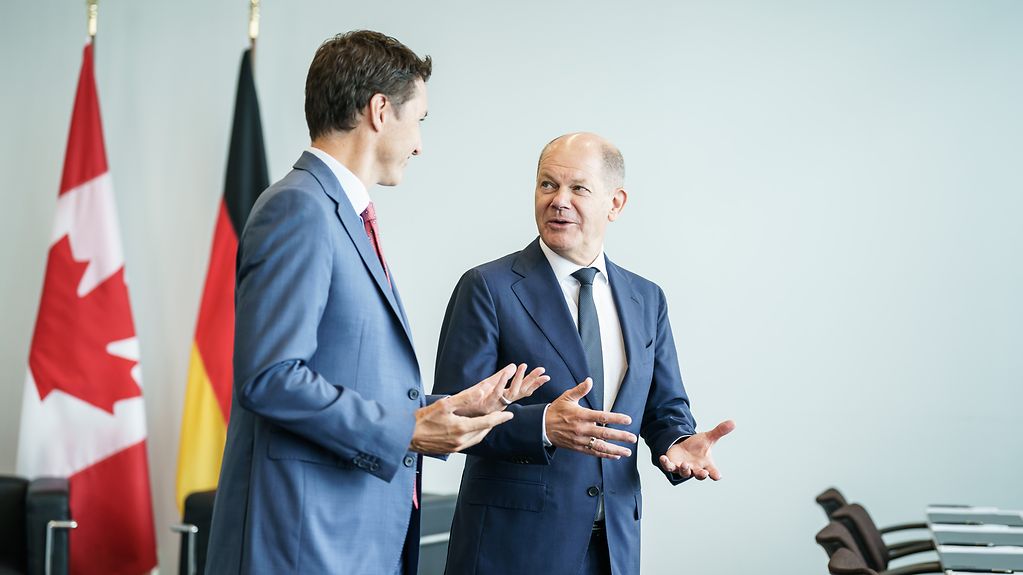Federal Chancellor Scholz in Canada
At the end of his trip to Canada, Federal Chancellor Scholz paid tribute to German-Canadian friendship “Our two countries are well matched in terms of their objectives, their ambitions and their ideas as to how we can put a stop to man-made climate change.” The two countries signed a declaration of intent regarding a German-Canadian hydrogen partnership. Another focus of the talks was the Russian war of aggression against Ukraine.
4 min reading time

Federal Chancellor Scholz (right) and his Canadian counterpart Trudeau emphasised the solid friendship and diverse partnerships between the two nations, now also to be strengthened in the energy sector.
Photo: Federal Government/Denzel
“Throughout our visit there was a palpable sense that the future is within reach,” concluded Federal Chancellor Olaf Scholz following his trip to Canada with Federal Minister of Economic Affairs Robert Habeck, which began on Sunday. At a joint press briefing with Canadian Prime Minister Justin Trudeau on Tuesday evening in Stephenville, Newfoundland, Scholz paid tribute to German-Canadian friendship.
Solid friendship
“Our two countries are well matched in terms of their goals, their ambitions and their ideas as to how we can put a stop to man-made climate change – and we also share the will to stick together in the face of the major challenges such as those posed by the Russian war of aggression on Ukraine. This demonstrates the solid friendship between our countries.”
On Tuesday evening, Federal Minister of Economic Affairs Habeck and Canada’s Energy Minister Wilkinson signed a declaration of intent regarding a German-Canadian hydrogen partnership, which will involve Canada exporting green hydrogen to Germany from 2025 onwards.
“Friends can rely on each other”
At the end of Chancellor Scholz’s visit, Prime Minister Trudeau stressed that the encounter had shown how friends are able to depend on each other and support each other. At the same time, the challenges posed by the climate crisis and Russia’s war of aggression against Ukraine offered opportunities to produce clean energy and create new jobs in the future, said Trudeau. In doing so, he said, his government would ensure that all projects were subjected to a rigorous approval process, both at the federal and provincial level: Canada owed this both to its foreign partners and to the local communities.
German-Canadian business conference
At a German-Canadian business conference on Tuesday, Federal Chancellor Scholz reaffirmed Germany’s key climate targets: climate neutrality by 2045 and an 80 percent share of renewable energies in the German energy mix by 2030. The aim was to achieve these in addition to becoming independent of Russian energy as quickly as possible, said Scholz.
Germany was counting on a close partnership with Canada, said Scholz, not only in the area of raw materials such as green hydrogen and liquefied gas, but also in terms of industrial cooperation, technology partnerships and collaborative research. As Germany shifted away from Russian energy, said the Chancellor, Canada was the partner of choice – another reason why he was pleased that Canada had accepted the invitation to become a partner country to Hannover Messe 2025. Federal Minister of Economic Affairs Robert Habeck, who accompanied the Chancellor on his trip, had also spoken previously of an “energy partnership for the future”.
In addition to Prime Minister Trudeau, numerous German and Canadian business representatives attended the conference in Toronto on Tuesday.
Solidarity with Ukraine
Another focus of the talks was the Russian war of aggression against Ukraine. “The international community will never accept Russia’s illegal, imperialist annexation of Ukrainian territory,” said Federal Chancellor Scholz at an online summit of the International Crimea Platform on Tuesday. Germany would stand firmly by Ukraine’s side for as long as support was needed, he added.
Specifically, he announced further arms deliveries to Ukraine, including three additional Iris-T systems, a dozen armoured recovery vehicles and 20 rocket launchers as well as precision ammunition and anti-drone weapons. He said that deliveries would take place in 2023, in some cases earlier. The deliveries were worth more than 500 million euros, said Scholz. Prime Minister Trudeau reiterated that Canada would likewise continue to provide support for Ukraine, thereby demonstrating joint German-Canadian solidarity.
Scholz previously stressed that Germany would continue to support Ukraine in its defensive struggle, not only with weaponsbut also by providing financial assistance. The Federal Chancellor noted that Germany had taken in more than 900,000 Ukrainian refugees to date. At the same time, he said, it was important to start considering the issue of post-war reconstruction in Ukraine. Together with its international partners, said Scholz, Germany was planning a reconstruction conference this year.
Canada – a reliable democracy
On several occasions during his visit to Canada, Federal Chancellor Scholz emphasised that Germany and Canada were pursuing very similar policies in the face of the challenges posed by climate change. “Canada has similar rich mineral resources so those of Russia – with the difference that it is a reliable democracy. This offers potential for new areas of cooperation,” said Scholz when he arrived in Montreal on Monday. And he also noted: “We share not just common values but a similar outlook, too.”
According to Chancellor Scholz, Russia’s refusal to take back the German gas turbine serviced in Canada for the Nord Stream 1 gas pipeline showed that President Putin was willing to weaponise energy under the pretext of technical issues. Germany and Canada had shown unity on this issue and thwarted Putin’s intentions, he said. He expressly thanked the Canadian government for this.


























